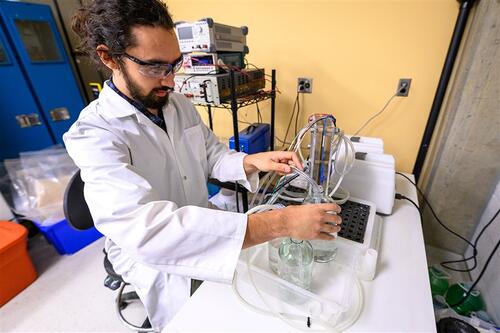Keith Cleland (MASc ‘22)
Student, Faculty of Engineering
> Founder, Aqua-Cell Energy
> Velocity
As someone born and raised in Calgary, Keith Cleland initially thought he would end up working in the oil industry. “Being from Alberta, that seemed like the natural thing to do,” he says.
However, Cleland decided to follow a different path and work for a sustainable future instead. “I really want to be contributing to sustainability, cleaning the world up and transitioning the world away from fossil fuels.”
Cleland leveraged his skills in electrochemistry and his passion for environmental sustainability to co-found Aqua-Cell Energy Inc., a start-up focused on designing affordable, safe energy storage for commercial and industrial solar power. Cleland’s company aims to address the issue of energy storage in the renewable energy industry using low-cost and sustainable materials.
During his undergraduate degree, Cleland began research to create a battery that would utilize salt water to store energy. In 2019 he began a MASc with Professor Jeff Gostick in the Department of Chemical Engineering researching saltwater flow battery technology. Working in Gostick’s Porous Materials Engineering & Analysis Lab (PMEAL), Cleland developed a prototype battery to store solar energy and produce electricity.
He partnered with Ellsworth Bell (MASc ’21) to found Aqua-Cell Energy. The company was nurtured through Venture Ready at University of Waterloo’s Velocity and won several pitch competitions.
Aqua-Cell Energy now has its home base in Edmonton. The company’s mission is to develop energy solutions for commercial and industrial properties, as well as for electricity grid operators. By utilizing Cleland’s saltwater batteries, solar energy can be stored at a cost-effective rate.

Cleland is working with NAIT, a local polytechnic, to improve his technology. NAIT’S Center for Grid Innovation houses a microgrid that Aqua-Cell Energy uses to test batteries to enable clean energy transition.
Although the use of saltwater batteries is more cost-effective than lithium-ion batteries, it requires a large volume of fluid. Cleland’s saline batteries are not what one would envision, they are the size of a shipping container. Aqua-Cell estimates that its batteries store energy at less than 50 per cent of the cost of traditional lithium-ion batteries.
Cleland believes his innovative technology will enable massive renewable electricity adoption by bridging the gap between affordability and effectiveness.
“We successfully scaled up the small bench scale that I was testing in PMEAL up to a full-size battery stack,” says Cleland. “We’ve gone from powering a light bulb to powering a house, so any further scale-up from here is multiplying what we’ve already achieved.”
Aqua-Cell Energy aims to sell batteries to renewable energy developers and industrial facilities who utilize solar energy such as having solar panels on their roofs, or businesses that operate fleets of electric vehicles and want to use more of the solar power they generate on site.
Cleland has several customers lined up who have agreed to host pilot electricity grids in Alberta to demonstrate that the technology works on a commercially relevant scale.
The next step for the company is to bring in more investment to increase the number of battery units they can produce. This new technology will provide cost-effective energy storage solutions for industry while reducing dependence on fossil fuels.
Eventually, if the battery can be developed for use on an even larger scale, hydro companies might be interested. Right now, the operators of electricity grids have a problem known as curtailment. This happens when there is more clean energy being produced than can be safely stored, which means the energy must practically be given away to neighbouring jurisdictions at prices far below what it costs to produce it. Better energy storage would save them a considerable amount of money.
Cleland is passionate about contributing to a cleaner environment.
“I believe we have the power to reduce fossil fuel emissions and be a catalyst for improving solar energy adoption. Expensive energy storage is a huge problem right now, but if we can bring those costs down and boost solar adoption, then we have a possibility to change the world.”

